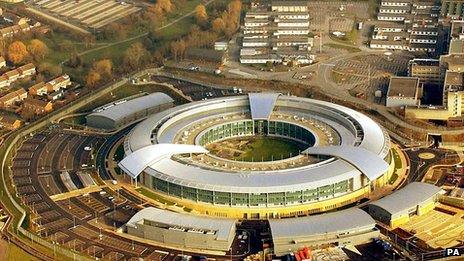UK spy agencies inquiry to take public evidence
- Published

Parliament's intelligence watchdog is to hear evidence from the public as part of a widening of its inquiry into UK spy agencies' intercept activities.
The Intelligence and Security Committee is examining whether laws governing intercept are "still fit for purpose".
The impact on people's privacy will also now be considered by the inquiry.
Concerns arose over "snooping" by the state after data-gathering centre GCHQ was cited in leaks by ex-US security contractor Edward Snowden.
The controversy sparked by Mr Snowden's leaks to the Guardian newspaper prompted the ISC inquiry.
In July, after reviewing GCHQ reports produced with material including US intelligence from its controversial Prism programme, the ISC decided that UK security services had not broken the law in accessing information on UK citizens.
The intercept activities of the UK spy agencies come under three pieces of legislation: The Intelligence Services Act 1994, the Human Rights Act 1998, and the Regulation of Investigatory Powers Act 2000.
'Needles in haystacks'
On Thursday, ISC chairman Sir Malcolm Rifkind said: "In recent months concern has been expressed at the suggested extent of the capabilities available to the intelligence agencies and the impact upon people' s privacy as the agencies seek to find the needles in the haystacks that might be crucial to safeguarding national security.
"There is a balance to be found between our individual right to privacy and our collective right to security.
"An informed and responsible debate is needed," he said, adding that the ISC had "therefore decided to broaden the scope of its forthcoming inquiry to consider these wider questions, in addition to those relating to the existing legislative framework."
He said the inquiry would continue to examine classified information but also invite written evidence "more broadly, including from the public, to ensure that the committee can consider the full range of opinions expressed on these topics".
Mr Rifkind said the committee, which meets in secret, also hoped to hold some future evidence sessions in public.
The ISC was recently given greater powers to scrutinise the work of the security services and last week Downing Street dismissed suggestions that there could be a government review of its role.
Nick Pickles, director of Big Brother Watch, welcomed the ISC announcement but said "such a debate cannot be allowed to take place behind closed doors and without pressing questions being asked about the legal justification for what we know to be already happening at GCHQ and elsewhere".
Shami Chakrabarti, director of civil liberties campaigners Liberty, said: "Some will say better late than never, others fear a tactical whitewash to calm public concern.
"It's certainly significant that the committee feels compelled to dig a little deeper but that's no substitute for much broader public and political debate."
- Published16 October 2013
- Published11 October 2013
- Published11 October 2013
- Published17 July 2013
- Published17 January 2014